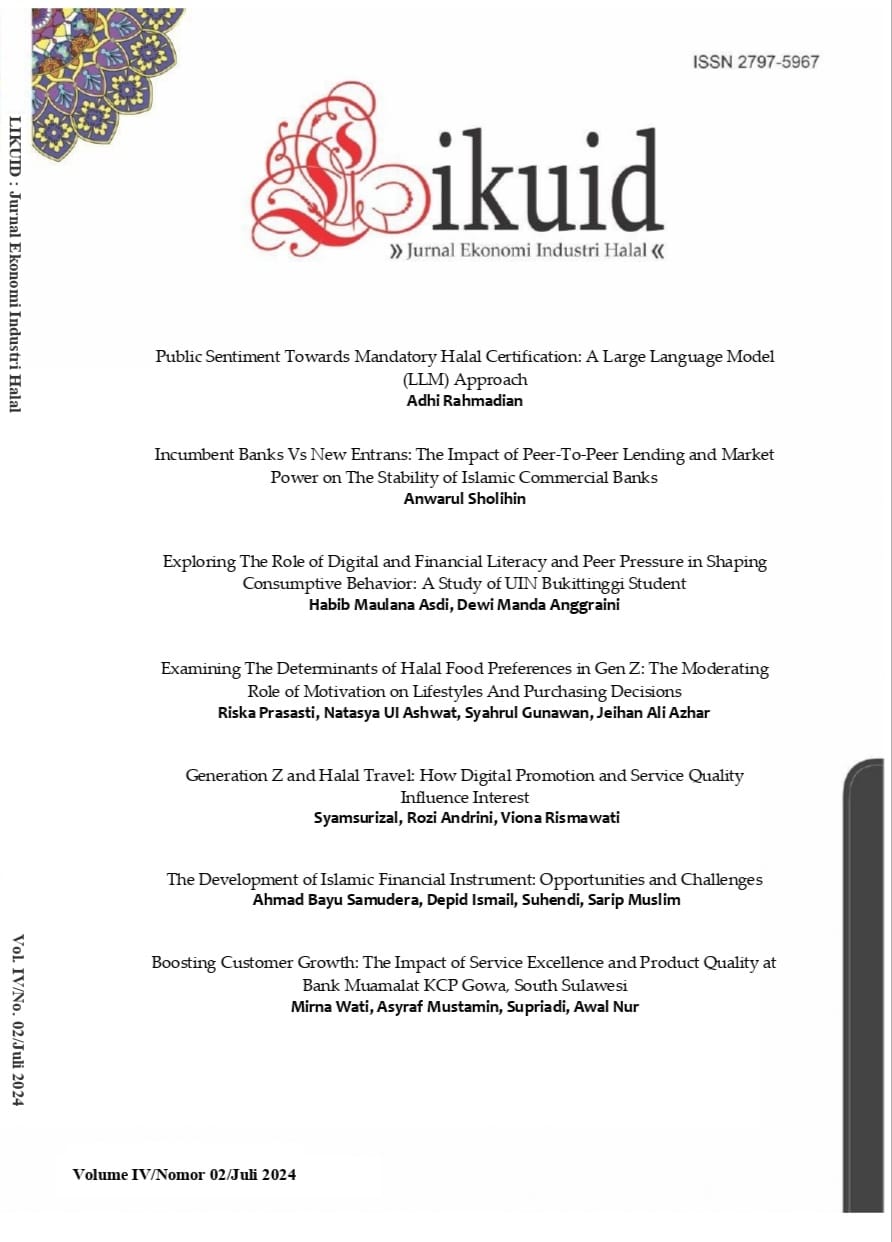Incumbent Banks Vs New Entrants: The Impact of Peer-To-Peer Lending and Market Power on The Stability of Islamic Commercial Banks
DOI:
https://doi.org/10.15575/likuid.v4i2.35107Keywords:
P2P Lending, Market power, Islamic Commercial Bank StabilityAbstract
References
Albaity, M., Mallek, R. S., & Noman, A. H. M. (2019). Competition and bank stability in the MENA region: The moderating effect of Islamic versus conventional banks. Emerging Markets Review, 38(June 2018), 310–325. https://doi.org/10.1016/j.ememar.2019.01.003
Allen, F., & Gale, D. M. (2000). Comparative financial systems: A survey. Center for Financial Institutions Working Papers, April. http://ideas.repec.org/p/wop/pennin/01-15.html%5Cnfile:///Users/pash/Documents/Papers/Allen/Allen 2001, Comparative financial systems A survey-1.pdf%5Cnpapers://55a508e7-3fef-4708-a14a-d97adb564c02/Paper/p3094
Ariss, R. T. (2010). Competitive conditions in Islamic and conventional banking: A global perspective. Review of Financial Economics, 19(3), 101–108. https://doi.org/10.1016/j.rfe.2010.03.002
Berger, A. N., Klapper, L. F., & Turk-Ariss, R. (2017a). Bank competition and financial stability. Handbook of Competition in Banking and Finance, 185–204. https://doi.org/10.4337/9781785363306.00018
Berger, A. N., Klapper, L. F., & Turk-Ariss, R. (2017b). Bank competition and financial stability. Handbook of Competition in Banking and Finance, August, 185–204. https://doi.org/10.4337/9781785363306.00018
Dwinanda, I. Z., & Sulistyowati, C. (2021). The Effect of Credit Risk and Liquidity Risk on Bank Stability. Jurnal Ilmu Ekonomi Terapan, 6(2), 255. https://doi.org/10.20473/jiet.v6i2.31144
Dyana, & Sapulette, M. S. (2020). Does Fintech Growth Affect Bank Stability: An Empirical Evidence from Indonesia Banking Industry. Otorisasi Jasa Keuangan, Vol.2,(1), 1–20.
FSB. (2017). Financial Stability Implications from Fintech: Supervisory and Regulatory Issues that Merit Authorities’ Attention. Financial Stability Board, June, 1–61. www.fsb.org/emailalert
Gujarati, D. N., & Porter, D. (2015). Dasar-Dasar Ekonometrika (5th ed.). Salemba Emoat.
Haddad, C., & Hornuf, L. (2021). The Impact of Fintech Startups on Financial Institutions’ Performance and Default Risk. SSRN Electronic Journal, April. https://doi.org/10.2139/ssrn.3837778
Irawan, M. A., & Kharisma, F. (2020). Pengaruh Net Operating Margin (NOM) terhadap Return On Asset (ROA) pada Perbankan Syariah Tahun 2013-2017. Borneo Student Research, 1(3), 1468–1473.
Jasmina, T., & Goeltom, M. S. (1995). Analisis Efisiensi Perbankan Indonesia : Metode Pengukuran Fungsi Biaya Frontier. Economics and Finance in Indonesia, 43, 251-284.
Li, Y., Spigt, R., & Swinkels, L. (2017). The impact of FinTech start-ups on incumbent retail banks’ share prices. Financial Innovation, 3(1). https://doi.org/10.1186/s40854-017-0076-7
Louati, S., Gargouri Abida, I., & Boujelbene, Y. (2015). Capital adequacy implications on Islamic and non-Islamic bank’s behavior: Does market power matter? Borsa Istanbul Review, 15(3), 192–204. https://doi.org/10.1016/j.bir.2015.04.001
Mahendra, R., & Prasetyo, M. B. (2017). The Analysis of Market Power and Bank Soundness on Islamic and non-Islamic Bank Behavior. January 2017. https://doi.org/10.2991/icbmr-17.2017.45
Mawardi, W. (2005). Mawardi, 2005.pdf. In Jurnal Bisnis dan Strategi: Vol. Vol. 14, N (pp. 83–93).
Novita, W. S., & Imanullah, M. N. (2020). Identifikasi Permasalahan Hukum dan Mekanisme Penyelesaian. Jurnal Privat Law, VIII(1), 153. https://e-journal.ikhac.ac.id/index.php/iijse/article/view/513
Nur Ajizah, S. D., & Agus Widarjono. (2023). Indonesia Islamic Banking Stability in The Shadow of Covid-19 Outbreak. Jurnal Ekonomi Syariah Teori Dan Terapan, 10(1), 57–68. https://doi.org/10.20473/vol10iss20231pp57-68
OJK. (2020). Perkembangan Fintech Lending Desember 2020. In Otorisasi Jasa Keuangan.
OJK. (2022). Statistik Fintech Lending Maret 2022. https://www.ojk.go.id/id/kanal/iknb/data-dan-statistik/fintech/default.aspx
Phan, D. H. B., Narayan, P. K., Rahman, R. E., & Hutabarat, A. R. (2020). Do financial technology firms influence bank performance? Pacific Basin Finance Journal, 62, 101210. https://doi.org/10.1016/j.pacfin.2019.101210
Zahrah, F., Fahmi, I., & Jahroh, S. (2019). Determinants of Profitability Level of Bank Syariah in Indonesia: a Case Study At Pt. Bank Syariah Mandiri. Russian Journal of Agricultural and Socio-Economic Sciences, 85(1), 312–320. https://doi.org/10.18551/rjoas.2019-01.39











